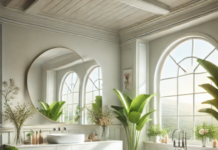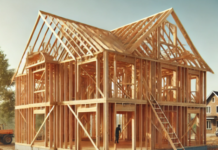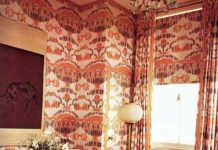 With their new renovation show Masters of Flip premiering tonight on W Network at 10 p.m. ET/PT, Dave and Kortney Wilson have brought their passion for flipping houses to the small screen. The Canadian couple are former country musicians, who live in Nashville, Tennessee with their three children. As part of the series, Kortney handles interior design, while Dave is responsible for project management. We chatted with the Wilsons about the challenges of flipping 45 houses, working as a husband and wife team and staying creative on the job.
With their new renovation show Masters of Flip premiering tonight on W Network at 10 p.m. ET/PT, Dave and Kortney Wilson have brought their passion for flipping houses to the small screen. The Canadian couple are former country musicians, who live in Nashville, Tennessee with their three children. As part of the series, Kortney handles interior design, while Dave is responsible for project management. We chatted with the Wilsons about the challenges of flipping 45 houses, working as a husband and wife team and staying creative on the job.
Real Style: What can you tell us about your new reality series, Masters of Flip?
Dave: It’s a reality series about Kortney and I flipping 12 houses over eight months. Each house is an hour episode
Kortney: Basically, it follows us doing what we’ve done over the last several years. Instead of a docu-series of us flipping houses, every episode is self-contained. We find it in the first part of the show, we renovate it and it even follows us with open houses, selling it, going over numbers. It’s nothing new as far as flipping is concerned, however our profit really different as far as Nashville. That’s what’s really very different from the other flipping shows. We happen to live in one of the hottest little communities in the country, in the United States. Dave and I definitely have an interesting dynamic, husband and wife trying not to take our house flipping….
Dave… jobs home with us.
Real Style: What were some of the challenges of flipping so many houses on the show, in just a few years?
Kortney: I’d say the biggest challenge for us is actually finding them, because over the last three or four years, Nashville has become a really competitive market. Actually being able to find two or three houses to choose from, for each episode, has been very, very difficult. Beyond that, we have the normal house flipping woes, managing crews, picking out design elements, staying on budget and finishing it on time. It’s not like new builds, where you kind of know going in “Okay, this is our price per square foot” to build a new house. It’s really different, in a way that a lot of these houses are over 100 years old.
 Real Style: What is your best advice for homeowners who are attempting a house flipping project this summer?
Real Style: What is your best advice for homeowners who are attempting a house flipping project this summer?
Kortney: Don’t flip with your husband!
Dave: Don’t flip with your wife! *laughs*
Kortney: Well, I would say that one of the tips we have (and I’m actually being serious) is to move out of the house while you’re renovating it. When you’re flipping your own house, it’s easier said than done to live amongst the dust. You need to kind of remove yourself from the situation every once in a while, especially if you have a family. I would say really lay out the kitchen well, because the kitchen is probably the hardest room to lay out and it’s the easiest thing to mess up.
Dave: Mine would be to really do your research on who is going to be working with you- what kind of crew you’re going to have. Your general contractor, you have to trust them and know that there are going to be surprises. Allow for that in your budget.
Real Style: Do you have any tips for homeowners who want to flip their smaller spaces on a budget?
Kortney: I think that for flipping a smaller space, when people are looking at smaller houses, they’re also looking at storage. They’re sacrificing square footage, but they still have stuff. Take that into consideration, and find really creative ways (whether it’s open cabinetry, secret storages, even under the furniture and beds) that will appeal to a potential future buyer, when you actually go and flip the property yourself to sell. So, there’s profit there.
Real Style: What are the biggest differences between the two of you in terms of design?
Kortney: Well, Dave doubts almost all of my design! *laughs*
Dave: Yes, I do! Right to the end.
Kortney: Right until the end! He does not see through some of the things that I do. Sometimes, there are design elements that cost just a little bit more money. It’s easier to see if there are structural issues- okay, we have to spend this, because we cannot pass codes, we cannot test if the house is structurally sound. It’s really hard for him to see if the design elements are cost effective, to even spend money on those elements. But at the end of the day, that’s what the buyer sees. They walk in, and that’s what they’re wowed by. We really have to be careful for the two of us to not step on each other’s toes. There’s a lot of trust involved, mainly him trusting me.
Dave: Which I do unwaveringly! I believe that I might be a little colour blind, and my judgment on placement of furniture and style of door sometimes, I put full trust in Kortney. She has an eye for it that I just do not have. That is where her strength is, and I just trust her. She passes me the puck and I run with it.
Real Style: Your show is set in Nashville, Tennessee and both of you are Canadian. Do you notice a big difference in renovation trends in Tennessee and here in Canada?
Kortney: That’s a hard question for us to answer, because we haven’t lived in Canada for so long, since 17 years. I was a teenager when I moved here. There are some distinctive differences, one being that Tennessee, specifically where we renovate, the master bedroom is really most desirable if it’s downstairs on the main level. From what we understand, especially in Ontario, all the bedrooms upstairs are a big deal. We’ve actually had to explain that on the show, because we’ll lose about 50 per cent of our buyers, just by putting the master up and not on the main floor. I’m sure there are some differences, in landscaping, in the concrete and maybe having driveways versus not. I think that’s really true from neighbourhood to neighbourhood, not from country to country.
Real Style: You originally moved to Nashville to pursue your country music careers. What inspired you to make the switch from the music industry to working in the renovation business?
Kortney: We were in and out of publishing deals and record deals. We had a record, and then we had a break, to tour. We needed to make a record, but we also needed to make money. So we started flipping, really to fill in the gaps. That’s sort of what started it, but house flipping has also been a really creative process for us, just like songwriting. Except it pays us! It was a logical thing for us to sort of evolve into, and so far it’s been working.



























